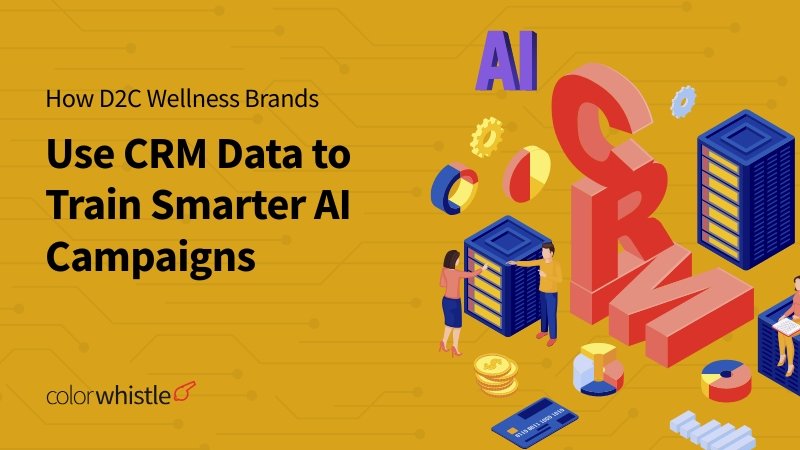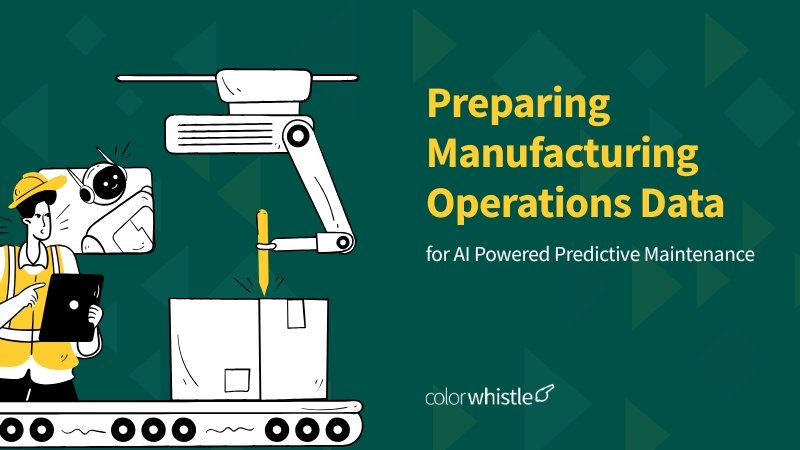The rise of direct-to-consumer (D2C) wellness brands has been a significant trend in the digital era, allowing these brands to bypass intermediaries and engage directly with consumers. These brands leverage the potential of digital marketing, offering personalized wellness products and services while building strong customer relationships.
Key takeaway: CRM data is crucial for training smarter AI campaigns. This combination allows D2C wellness brands to deliver personalized marketing at scale, enhancing customer experiences and driving business growth.
Understanding how CRM data powers AI-driven personalization will reveal the strategies that successful D2C wellness brands employ to stay ahead in a competitive market. To achieve this, many brands partner with companies like ColorWhistle, which provides comprehensive digital marketing services, including SEO, PPC, SMO, and more.
The Role of CRM in Driving Personalization for D2C Wellness Brands
Definition and Role of CRM Platforms in D2C Wellness Businesses
Customer Relationship Management (CRM) platforms are essential tools for modern D2C wellness brands. These systems help businesses manage their interactions with current and potential customers, with the goal of improving relationships and driving sales growth. For wellness brands that sell directly to consumers, CRMs provide valuable insights into customer behaviors, preferences, and engagement patterns.
A wellness CRM serves several critical functions:
Data Centralization: Collects and consolidates data from various touchpoints into a single unified system.
Customer Segmentation: Allows businesses to categorize customers based on diverse criteria such as demographics, behavior, or purchase history.
Automated Marketing: Facilitates personalized marketing campaigns through automated workflows.
Capturing and Storing Rich Customer Data
Effective CRM systems capture a variety of data points that are essential for creating personalized customer experiences:
Preferences: Information about individual customer likes and dislikes enables brands to tailor recommendations and communications.
Purchase Behavior: Historical data on what customers have bought helps in forecasting future purchases and understanding buying patterns.
Engagement History: Tracks how often and through which channels customers interact with the brand.
Wellness Objectives: Insights into personal goals or health milestones that customers aim to achieve.
This rich customer data is crucial for wellness brands looking to deliver highly personalized experiences.
Also Read
Importance of Structured and Tagged Data for Effective AI Utilization
For AI algorithms to work effectively, the data within CRM systems must be well-organized and properly labeled. This means categorizing information using consistent tags so that AI can easily understand it. Proper data organization allows AI models to:
- Recognize patterns in customer behavior
- Predict future actions
- Tailor communication strategies accordingly
Types of tags relevant to wellness customers might include:
Product Interests: Categories such as supplements, fitness gear, or mental wellness tools.
Health Goals: Tags like weight loss, muscle gain, stress reduction.
Engagement Frequency: Labels indicating high, medium, or low interaction levels.
Examples of Popular CRM Platforms Used by Wellness Brands
Several CRM platforms are particularly popular among D2C wellness brands due to their robust features tailored for personalization:
HubSpot
- Known for its user-friendly interface
- Comprehensive marketing automation tools
- Advanced segmentation capabilities
Zoho CRM
- Strong analytical tools
- Customizable dashboards
- Efficient workflow automation features
Salesforce
- Highly scalable solutions
- Extensive third-party integrations
- Powerful AI-driven insights through Salesforce Einstein
Klaviyo
- Specializing in email marketing automation
- Integrates seamlessly with e-commerce platforms
- Advanced personalization features based on user behavior
GoHighLevel, known for its extensive CRM integration capabilities, which streamline business processes and improve automation efficiency.
By using these CRM platforms, D2C wellness brands can effectively leverage customer data to power smarter AI-driven campaigns. This combination of human insight and machine learning leads to better personalization at scale, creating stronger connections with consumers while maximizing marketing effectiveness.
Leveraging AI for Personalized Recommendations and Re-Engagement in D2C Campaigns
AI marketing has changed the way D2C wellness brands run personalized wellness campaigns. By looking at CRM data, AI models can customize messages and offers based on individual consumer behaviors and preferences, providing a tailored customer experience.
How AI Analyzes Data
AI algorithms go through large amounts of CRM data to find patterns and trends in how customers behave. This includes:
Analyzing Purchase History: AI looks at past transactions to predict future buying behaviors. For instance, if a customer often buys supplements during winter, the AI can expect similar purchases in upcoming winters.
Tracking Engagement: Keeping an eye on interactions across different channels (like email opens and social media likes) helps AI understand interest levels and modify outreach strategies accordingly.
Identifying Preferences: By studying product searches, wish lists, and browsing history, AI figures out individual preferences and suggests relevant products.
Delivering Personalized Content Across Channels
D2C wellness brands use these insights to send personalized content through various channels:
Email Marketing: Customized emails with product recommendations based on previous purchases or interests. For example, a customer who bought yoga mats before might get emails about new yoga accessories.
SMS Notifications: Instant updates about special deals or restocked items that match the customer’s health goals.
Push Notifications: Immediate alerts on mobile devices about upcoming sales or personalized wellness tips.
Examples of Successful Implementation
Brands have effectively used AI-driven CRM data for personalized marketing:
- Headspace, a meditation app, uses CRM data to send personalized meditation recommendations via email based on user activity patterns.
- Fitbit employs AI to analyze user fitness data from their CRM system, offering tailored workout suggestions and health tips through push notifications.
By leveraging AI for real-time personalization, D2C wellness brands are not only improving customer experiences but also boosting engagement rates and conversions. With each interaction becoming more relevant and timely, customers feel valued and understood, leading to loyalty and repeat business.
This smooth integration of AI with CRM systems shows a clever approach to modern marketing, where every piece of data plays a role in creating a smarter, more effective campaign strategy.
Data Tagging and Structuring Practices for AI-Ready CRM Systems
High-performing D2C wellness brands treat their CRM as more than just a contact database—it’s the foundation for building AI-driven customer experiences. Data tagging and meticulous data structuring transform raw CRM records into rich, actionable profiles that fuel smarter AI training datasets. Elevating CRM data quality isn’t just about capturing more information, but about organizing it in a way that unlocks advanced insights.
Best Practices for Organizing and Tagging CRM Data
- Standardize Data Input: Use consistent formats for customer details (e.g., date of birth, location, preferences) to avoid discrepancies that confuse AI models.
- Implement Hierarchical Tagging: Group related data points under parent tags (e.g., “Product Interests” with child tags like “Vitamins,” “Sleep Aids,” or “Fitness Equipment”) for granular segmentation.
- Leverage Automated Workflows: Automate tag assignment based on customer behaviors, such as adding a “Repeat Buyer” tag after multiple purchases or “Lapsed User” after inactivity.
- Audit Regularly: Periodically review and refine tags to ensure relevance as products, content, and consumer trends evolve.
Types of Tags Most Relevant to Wellness Brands
Wellness-focused D2C brands benefit from tailoring their tagging strategy to their audience’s unique needs:
Product Interests: Identify which categories or specific products a customer browses or buys most frequently.
For example:
- Supplements
- Fitness Gear
- Mindfulness Tools
Health Goals
- Weight Management
- Stress Reduction
- Sleep Improvement
Engagement Frequency: Monitor how often customers interact with emails, SMS, or app push notifications.
Lifecycle Stage: Tags like “New Subscriber,” “Active Member,” or “At-Risk Churn” help segment campaigns by where each customer is in their journey.
Purchase Behavior: Track average order value, subscription status, and recency of last purchase.
Content Preferences: Note if a user prefers educational articles over promotional offers, or shows higher engagement with video versus written guides.
“The smarter your data tagging and structuring strategy, the easier it becomes for AI to recognize patterns that truly matter to your customers.”
Applying these best practices ensures CRM data isn’t just plentiful—it’s primed for impactful AI training. When every touchpoint is tagged and structured with intent, wellness brands can unlock nuanced personalization across the board. The next step is integrating these robust datasets with CRM-AI tools for seamless multi-channel campaign activation.
To further enhance the effectiveness of these strategies, consider leveraging SEO services to optimize your online presence and attract more customers. Additionally, a website redesign may be beneficial in improving user experience and increasing conversion rates on your digital platforms.
Integrating CRM-AI Tools for Seamless Multi-Channel Campaign Activation in D2C Wellness Marketing
D2C wellness brands thrive on their ability to create consistent customer experiences across all digital platforms. Integrated CRM-AI tools are crucial for aligning messages, offers, and recommendations throughout a consumer’s journey, transforming disjointed communications into a smooth story.
Synchronizing Messaging Across Owned Channels
Modern CRM-AI solutions eliminate data barriers, enabling brands to coordinate campaign activation across:
- Email marketing: Customized product recommendations and wellness advice sent at the best times.
- SMS campaigns: Immediate reminders, exclusive deals, or appointment confirmations based on user actions.
- Push notifications: Timely alerts on mobile apps about new products or personalized content.
- On-site messaging: Dynamic banners or chat prompts that reflect a user’s purchase history or interests.
Each interaction relies on the same centralized CRM data, ensuring that whether a customer opens an email or visits the website, they receive relevant communication. For instance, if a customer leaves their cart after looking at sleep supplements, an AI-powered system can trigger both a reminder SMS and an email with sleep improvement content, coordinated in tone and timing.
Consistency Drives Conversion in Wellness Campaigns
Multi-channel engagement is more than just being present; it’s about providing a consistent customer experience. When messages are cohesive, regardless of the channel, customers perceive greater value and trust the brand’s expertise. Consistent communication reinforces core wellness messages, aligns with individual health goals, and reduces confusion caused by conflicting or repetitive outreach.
Brands using CRM-AI integrations see tangible improvements:
- Higher open rates and click-throughs from aligned messaging
- Fewer opt-outs due to relevant and non-intrusive touchpoints
- Increased conversion rates as customers receive the right offer at precisely the right moment
Sending contextually relevant communication not only builds loyalty but also maximizes the effectiveness of every campaign activation. This integrated strategy enables D2C wellness brands to respond naturally as customer needs change across channels.
Enhancing Data Richness Through Integration for Smarter AI Targeting in D2C Wellness Brands’ Campaigns
Keywords: data enrichment, system integration, customer segmentation.
Combining CRM datasets with external sources is crucial in creating a comprehensive customer profile. This holistic view allows D2C wellness brands to understand their customers on a deeper level, tapping into varied data points that reveal intricate details about preferences and behaviors.
Key Approaches for Data Enrichment:
Integrating Third-Party Data Sources:
- Social Media Data: Engagement metrics from platforms like Instagram and Facebook provide insights into consumer interests and social behaviors.
- Behavioral Data: Using tools such as Google Analytics or Mixpanel helps capture site interaction patterns, adding layers of behavioral insights.
- Transactional Data: Payment processors and e-commerce platforms can supply purchase histories and spending habits.
First-Party Data Enhancement:
- Surveys and Feedback Forms: Directly gathering customer feedback enriches profiles with qualitative insights.
- In-App Activity: Monitoring how users interact with wellness apps or online services offers a dynamic view of customer engagement.
Benefits of Enriched Datasets in AI-Driven Segmentation:
Precision in Customer Segmentation:
AI models leverage enriched datasets to segment audiences with remarkable accuracy. By analyzing a combination of CRM data and external inputs, segmentation moves beyond basic demographics to include psychographic and behavioral dimensions.
- For instance, wellness brands can identify segments such as:
- Fitness enthusiasts who regularly purchase workout supplements.
- Mindfulness practitioners are interested in meditation apps and related content.
- Customers focused on specific health goals like weight loss or stress reduction.
Enhanced Personalization Efforts:
With richer data, AI-driven personalization becomes more sophisticated. Brands can tailor campaigns to reflect not only past purchases but also nuanced preferences inferred from broader datasets.
- Examples include:
- Sending personalized workout plans based on previous activity levels.
- Recommending dietary supplements aligned with specific health goals identified through surveys and purchase history.
Real-World Application
Brands like Noom integrate CRM data with external sources, offering personalized health plans by combining user feedback, engagement data from their app, and external health metrics. This multi-faceted approach increases the relevance and effectiveness of their recommendations, driving better user engagement and satisfaction.
Data enrichment through effective system integration lays the groundwork for smarter AI targeting. It fuels precise segmentation and enables highly tailored marketing efforts that resonate deeply with individual customers’ needs and preferences. The use of advanced tools such as GoHighLevel, which employs AI-driven automation for CRM management, further enhances the efficiency of these processes by implementing smart workflows that significantly boost business scalability.
The Future of D2C Wellness Marketing: Using AI and CRM Data for Personalized Experiences
The future of D2C wellness marketing is being shaped by rapid innovation at the intersection of AI and CRM data. Brands are moving beyond simple segmentation to deploy advanced, real-time personalization engines that anticipate individual needs and drive higher engagement. As machine learning models grow in complexity and accuracy, they unlock new levels of insight into customer wellness journeys.
Also Read
What to Expect from AI-Powered Personalization in D2C Wellness Marketing
Here are some key areas where we can expect to see benefits from AI-powered personalization in the D2C wellness industry:
- Predictive Customer Insights: AI will forecast not just what a customer is likely to purchase, but when, why, and through which channel, enabling micro-moment targeting that feels intuitive rather than intrusive.
- Hyper-Segmentation: As CRM systems evolve, expect smarter segmentation based on nuanced behavioral signals, like stress triggers, routine changes, or evolving health goals, mapped to dynamic content strategies.
- Conversational AI & Virtual Wellness Advisors: Integrating chatbots and virtual assistants powered by CRM data allows for two-way interactions, providing personalized coaching, product recommendations, and wellness check-ins at scale.
- Ethical Data Practices: With consumer expectations rising around transparency and privacy, brands will adopt privacy-first frameworks that leverage only consented first-party data for campaign training and activation.
Moving Towards Empathetic Digital Experiences
As the landscape evolves, “How D2C Wellness Brands Use CRM Data to Train Smarter AI Campaigns” becomes less about automation alone and more about building truly empathetic digital experiences that nurture long-term loyalty. The future points toward seamless integration where every touchpoint leverages rich insights to create value-driven relationships between brands and wellness-conscious consumers.
Moreover, AI-powered website maintenance is becoming an essential aspect for many businesses, including those in the wellness sector. This ensures that their digital platforms remain fast, secure, and accessible while providing an optimal user experience.
Conclusion
Direct-to-consumer wellness brands are changing the game when it comes to marketing. They’re using CRM data to create smarter AI-driven campaigns that connect with customers. By combining detailed customer profiles and identity resolution, these brands can pinpoint exactly who their most interested shoppers are. With the power of AI analyzing this rich CRM data, personalized marketing on a large scale is finally within reach.
Here’s how these strategies are making a difference:
- Customer Segmentation: Tailoring messaging and offers based on lifecycle stages or behaviors significantly enhances engagement.
- Marketing Automation: Efficiently running acquisition, retargeting, and cross-sell campaigns optimizes creative content, timing, and channel mix.
- Predictive Analytics: Utilizing historical interaction data from CRM systems allows for orchestrated customer journeys that boost loyalty and retention.
Using AI in the wellness industry helps build stronger relationships with customers, improves return on investment (ROI), and leads to sustainable revenue growth. It’s also important to prioritize privacy compliance by using first-party data for engaging with customers across various digital platforms.
By combining advanced AI capabilities with evolving CRM systems, D2C wellness brands can create marketing strategies that are driven by data. These strategies will not only be personalized but also scalable and respectful of privacy concerns. The future of D2C wellness marketing lies in seamlessly integrating CRM data with AI technologies to enhance customer experiences and achieve better business results.
Browse our ColorWhistle page for more related content and learn about our services. To contact us and learn more about our services, please visit our Contact Us page.
FAQs (Frequently Asked Questions)
What role does CRM data play in training smarter AI campaigns for D2C wellness brands?
CRM data captures detailed customer information such as preferences, purchase history, and wellness goals, which is essential for training AI models. This data enables AI to deliver personalized marketing campaigns at scale by tailoring messaging and product recommendations based on individual consumer behavior.
How do D2C wellness brands leverage AI for personalized recommendations and customer re-engagement?
D2C wellness brands use AI algorithms to analyze CRM data in real-time, allowing them to create highly personalized content across multiple channels like email, SMS, and push notifications. This approach enhances customer engagement by delivering relevant offers and wellness advice tailored to each consumer’s unique preferences and health objectives.
Why is data tagging and structuring important in CRM systems for AI readiness?
Proper data tagging and structuring within CRM platforms ensure that customer information is organized and easily interpretable by AI systems. Tags related to product interests, health goals, and engagement frequency improve the quality of AI training datasets, enabling more accurate personalization and predictive analytics in wellness marketing campaigns.
What are the benefits of integrating CRM-AI tools for multi-channel campaign activation in D2C wellness marketing?
Integrating CRM with AI tools allows seamless synchronization of messaging across various owned channels, creating a unified customer experience. This integration ensures consistent, contextually relevant communication that drives higher conversion rates by engaging customers effectively throughout their wellness journey.
How does enhancing data richness through system integration improve AI targeting in D2C wellness campaigns?
By combining CRM datasets with external data sources, D2C wellness brands develop comprehensive customer profiles that enable more precise segmentation. Enriched datasets empower AI-driven personalization efforts to target consumers with greater accuracy, resulting in more effective marketing strategies and improved campaign performance.
What future trends can we expect in D2C wellness marketing with the integration of AI-powered personalization and CRM data?
The future of D2C wellness marketing lies in advanced AI capabilities integrated with evolving CRM systems. Brands will increasingly adopt predictive analytics and marketing automation to deliver hyper-personalized experiences at scale, driving better customer retention, enhanced engagement, and optimized direct-to-consumer strategies focused on data-driven wellness marketing.
What’s Next?
Now that you’ve had the chance to explore our blog, it’s time to take the next step and see what opportunities await!





